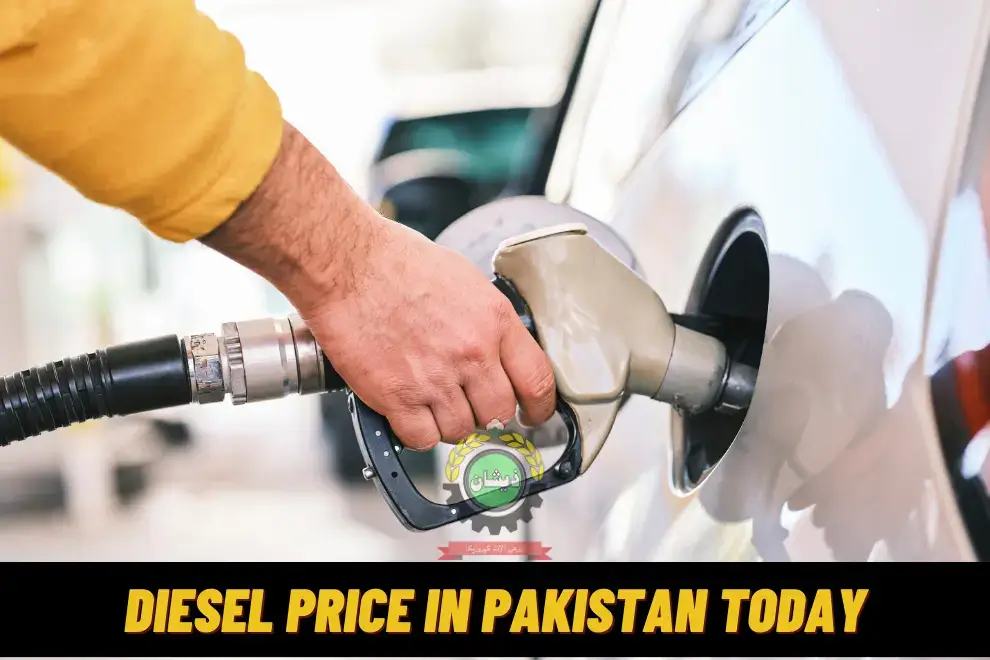Diesel Price in Pakistan Today 2026 | Latest Diesel Rate Per Liter
Are you keeping a close eye on the Diesel Price in Pakistan today? Well, you’re not alone. In a world where fuel prices seem to be in a perpetual state of flux, it’s essential to stay updated on the latest developments. As of now, the most recent diesel rate in Pakistan today stands at Rs. 267.95 for each liter. But what factors are driving these fluctuations, and how do they impact various stakeholders, from industries to consumers?
In this comprehensive article, we’ll delve into the intricacies of today’s diesel rate in Pakistan, exploring historical trends, current rates, influencing factors, government policies, industry perspectives, and more. So, let’s embark on this journey to understand the dynamics of diesel pricing in Pakistan.

Today Diesel Price in Pakistan 2026 | Updated Rates
As of today, diesel is an integral part of Pakistan’s energy landscape, powering various sectors, from transportation to agriculture. The diesel price displayed on this page is refreshed daily to ensure you stay fully informed. Due to the fluctuating value of the US Dollar, diesel rates in Pakistan exhibit instability.
Oftentimes, OGRA recommends adjustments to the pricing structure, generally every month. The authority entrusted with overseeing petroleum product prices in Pakistan is the Oil and Gas Regulatory Authority (OGRA). The current Diesel price in Pakistan, as outlined in the Federal Budget 2023-24, is presented below.
| Fuel Type | Price per Liter |
|---|---|
| High Speed Diesel | Rs. 267.95 |
| Light Speed Diesel | Rs. 148.95 |
Read Related Articles:
Cotton Price in Pakistan Today
Fertilizers Khad Rate in Pakistan Today
Historical Perspective
To comprehend the present, we must first glance into the past. Over the years, diesel prices in Pakistan have experienced their fair share of highs and lows. These fluctuations have been influenced by a myriad of factors, including global oil market trends, government policies, and economic dynamics. Understanding this historical context provides valuable insights into the current state of diesel pricing.
Factors Impacting the Diesel Price in Pakistan
International Oil Market
The international oil market plays a pivotal role in determining the diesel price in Pakistan. Fluctuations in global crude oil prices directly impact the cost of diesel. In this section, we’ll delve into how international factors can send ripples through Pakistan’s diesel pricing landscape.
OPEC Influence
The Organization of the Petroleum Exporting Countries (OPEC) is a major player in the global oil market. Any decisions made by OPEC member countries regarding production quotas and supply levels can significantly affect diesel prices in Pakistan.
Crude Oil Production
The level of global crude oil production also has a substantial impact on diesel pricing. Reduced production can lead to supply shortages and price hikes, while increased production can lead to more stable prices.
Domestic Factors
Diesel price in Pakistan is not solely influenced by international dynamics. Several domestic factors come into play, including taxation, exchange rates, and the balance of supply and demand.
Taxation
The tax regime imposed on diesel by the government plays a pivotal role in determining its price at the pump. Understanding the taxation structure is crucial for comprehending the overall cost of diesel in Pakistan.
Exchange Rates
Fluctuations in exchange rates can either cushion or exacerbate the impact of international oil price changes on diesel costs. A weakened Pakistani Rupee can lead to higher diesel prices.
Supply and Demand
The balance between the supply and demand for diesel within Pakistan is a key factor in price determination. Seasonal variations and economic activities can significantly influence this equilibrium.
Government Policies That Affect Diesel Price
The government of Pakistan holds a substantial role in shaping the diesel pricing landscape through various policies, including subsidies, price regulation, and environmental regulations.
Subsidies and Their Effects
Subsidies can either mitigate the financial burden on consumers or strain government finances. Understanding the implications of these subsidies is essential for assessing their long-term sustainability.
Fuel Price Regulation
The government often intervenes in diesel pricing through regulation. Understanding how these regulations are structured and enforced provides valuable insights into price stability.
Environmental Regulations
Environmental concerns are a global priority. In Pakistan, policies aimed at reducing emissions and promoting cleaner fuels can impact the pricing and availability of diesel.
Industry Perspectives on Diesel Price in Pakistan
The impact of diesel prices in Pakistan is felt deeply across various industries, each with its own unique set of challenges and strategies for coping with fluctuating costs. In this section, we’ll take a closer look at how key sectors perceive and navigate the ever-changing landscape of diesel pricing.
Transportation Sector
For the transportation sector, diesel is the lifeblood that keeps vehicles on the move. From long-haul trucks to public transportation, the cost of diesel directly affects operational expenses. When diesel prices rise, transportation companies often pass these costs onto consumers through increased fares or shipping rates. Conversely, when prices fall, they may enjoy higher profit margins. However, this volatility can make long-term planning and budgeting a challenging endeavor.
Agriculture and Farming
Agriculture is the backbone of Pakistan’s economy, and diesel is an essential component in farming operations. Diesel-powered machinery, such as tractors and pumps, are vital for planting, harvesting, and irrigation. Fluctuations in diesel prices directly impact the cost of production for farmers, affecting food prices and the overall economy. Farmers are often at the mercy of diesel price volatility, and government policies play a critical role in stabilizing their expenses.
Construction Industry
Construction companies rely on diesel-powered equipment for excavations, transportation of materials, and running generators at construction sites. As diesel prices increase, construction projects may face delays or increased costs, affecting project timelines and budgets. The construction industry often seeks innovative ways to reduce diesel consumption through technology and operational improvements.

Consumer Implications
The fluctuations in the diesel price in Pakistan have significant implications for consumers across the country. Whether you are a motorist, a household, or a small business owner, the cost of diesel can have a direct impact on your budget and lifestyle.
For motorists, diesel rates directly affect the cost of daily commuting and transportation. When diesel prices rise, it results in higher fuel expenses, putting a strain on household budgets. This can lead to consumers reconsidering their travel plans, carpooling, or even switching to more fuel-efficient vehicles to mitigate the financial burden. Conversely, lower diesel costs provide relief to motorists, allowing them to allocate their savings to other necessities or discretionary spending.
Households that rely on diesel-powered generators for backup electricity face increased costs during periods of high diesel prices. The additional expenses can be particularly challenging for those living in areas with frequent power outages. In such cases, families may need to limit their generator usage or explore alternative energy sources.
Predictions and Future Trends
The future of diesel prices in Pakistan remains a topic of significant interest and speculation. It is expected that the international oil market will continue to increase, and be influenced by global events, geopolitical tensions, and supply-demand dynamics. These fluctuations in crude oil prices will directly impact diesel costs within Pakistan, making it essential for stakeholders to closely monitor global developments.
Government policies and subsidies will play a crucial role in shaping diesel pricing in the coming years. The Pakistani government may choose to maintain subsidies to stabilize diesel costs, but the sustainability of such measures will be a concern. Future policies may also focus on environmental sustainability, potentially incentivizing cleaner energy alternatives and imposing stricter emissions regulations. Technological advancements, such as more fuel-efficient vehicles and machinery, may offer consumers and businesses ways to reduce their reliance on diesel, mitigating the effects of price fluctuations.
However, it’s clear that the energy landscape in Pakistan is evolving, influenced by a complex interplay of factors, including international markets, government decisions, technological innovations, environmental considerations, and changing consumer behaviors.
Read Related Articles:
Rotavator Rotary Tiller Price in Pakistan
Conclusion of Diesel Price in Pakistan
In conclusion, understanding the Diesel Price involves navigating a complex web of international and domestic factors, government policies, and industry perspectives. As consumers, businesses, and policymakers grapple with the challenges posed by fluctuating diesel costs, it’s essential to stay informed and proactive. The dynamics of diesel pricing in Pakistan are a testament to the interconnectedness of the global energy landscape. As we move forward, addressing environmental concerns and fostering a resilient energy sector will be key priorities.
FAQs (Frequently Asked Questions)
Diesel prices in Pakistan change daily due to the fluctuating value of the US Dollar and recommendations from the Oil and Gas Regulatory Authority (OGRA).
No, diesel prices can vary from one province or city to another due to transportation expenses and regional factors.
Several companies, including PSO, Shell, Total, GO, Byco, Hascol, Attock, and others, are responsible for supplying diesel in Pakistan.
Diesel prices can affect transportation costs, the prices of essential goods, and overall living expenses for the average Pakistani.
The government takes various measures, including subsidies and taxation policies, to manage diesel prices and mitigate their impact on consumers.






